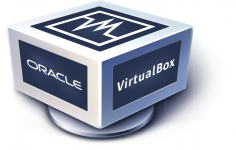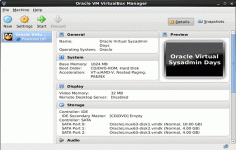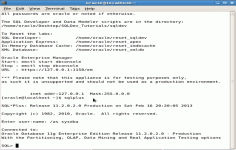 VirtualBox 5.1.26.117224
VirtualBox 5.1.26.117224
Oracle - ( Open Source)
VirtualBox is an easy and elegant solution for those who want to control a computer from another computer.
VirtualBox offers virtualize your operating system (OS) guests on a host machine. Called hypervisor, the application supports Windows OS X, Linux, Mac, Solaris, FreeBSD, etc.. as host, Mac OS X missing the call as a guest.
It also includes a remote access via HTTP protocol, convenient for demonstrations on a clean system. The ability to manage multiple states of the system is particularly interesting and its interface is very simple.
Virtualization solutions allow installing an operating system on a virtual machine using the resources of the host PC , thus enjoying very good performance. In the genre, several solutions are known for their ease of use, such as VMware Workstation , Parallels Desktop or Microsoft Virtual PC 2007 SP1.
A virtual machine is a useful way to use two operating systems simultaneously and harmless to the host computer. There is the possibility to install Linux on a virtual machine on Windows and vice versa .
- Title:
- VirtualBox 5.1.26.117224
- File Size:
- 118.0 MB
- Requirements:
- Windows XP / Vista / Windows 7 / XP 64-bit / Vista 64-bit / Windows 7 64-bit / Windows 8 / Windows 8 64-bit / Windows 10 / Windows 10 64-bit
- Language:
- en-us
- License:
- Open Source
- Date Added:
- 28 Jul 2017
- Publisher:
- Oracle
- Homepage:
- http://www.oracle.com
- MD5 Checksum:
- 4FB0270F766EE259702A8B09D06CA916
VMM: reset the TSC on VM reset to work around a Windows bug.
Audio: fixed memory leak when enabled with VRDP connections (5.1.24 regression).
Audio: fixed creation of too many sound sinks on Linux hosts when using the PulseAudio backend.
Audio: implemented record gain registers for AC'97 emulation; those are needed for newer Ubuntu guests which rely on those when controlling gain and muting the recording (capturing) levels.
Storage: fixed hang when using the emulated NVMe controller with the SPDK.
Mouse: double click was not working with a precision touchpad.
Linux hosts: properly bring up host-only network interfaces with iproute (5.1.24 regression).
Linux hosts: provide Python 3 libraries for deb/rpm packages.
Windows hosts: make it possible to use host-only networking without having bridged networking installed.
Windows guests: fixed automatic logons for Vista and newer Windows guests (5.1.24 regression).
Related software
0.1/5 from 1120 users


